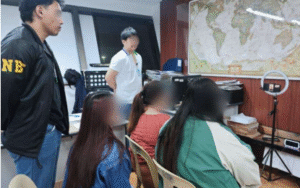A growing number of Filipino-Americans are turning to creative storytelling to rediscover their heritage—and one initiative is capturing hearts through animation.
Filmmaker Joel Nathan “Bani” Logroño recently appeared on The Chairman’s Report, hosted by Commission on Filipinos Overseas (CFO) Secretary Dante “Klink” Ang II, to share the story behind The Filipino Story—a nonprofit series aiming to reconnect the diaspora with Filipino culture and identity.
Described by Logroño as “a friend telling you what being Filipino is,” the animated project offers a fresh, relatable way for overseas Filipinos and their children to engage with their roots—without relying on dense academic language.
The initiative began during the pandemic as an offshoot of The Filipino School in San Diego, which had provided cultural and language classes for Fil-Am families. When the school was forced to close, founder Tony Olaes sought to keep its mission alive—drawing inspiration from The Bible Project to launch a digital series rooted in historical storytelling.
Produced by a team of 10 creatives—comprising animators, composers, and historians—the series brings to life key episodes from Philippine history, including a tribute to World War II’s Hunters ROTC guerrillas. Logroño noted that these stories revealed the deeper spirit of heroism—or bayani—embedded in Filipino identity.
“Bayani is someone who fights for others by serving others… not necessarily through fighting an enemy, but through serving the people that they love, expecting nothing in return,” he said, drawing a powerful parallel with overseas Filipino workers. “That’s why we call them the modern bayani.”
The CFO echoed this sentiment, highlighting the importance of cultural preparedness among Filipinos leaving the country. “We try to do our due diligence to ensure that people are not just prepared economically, but also socially and culturally,” said Ang, reinforcing the agency’s support for platforms like The Filipino Story.
The animated series tackles historical figures such as Jose Rizal and Jose Abad Santos, while also exploring universal themes of identity, migration, and belonging. Logroño’s call to Filipinos—both abroad and at home—is simple yet moving: “Rediscover what it means to be Filipino.”
Future plans include releasing the final episodes of the six-part series and expanding into more stories from the global Filipino community. “We’re going to continue producing more videos and interviews from the diaspora,” Logroño said.
The CFO, for its part, continues to push digital cultural outreach through projects like Virtual Sentro Rizal, an online portal for Filipino literature, art, and heritage content—part of the broader Bagong Pilipinas agenda to nurture globally connected Filipinos grounded in shared values.












